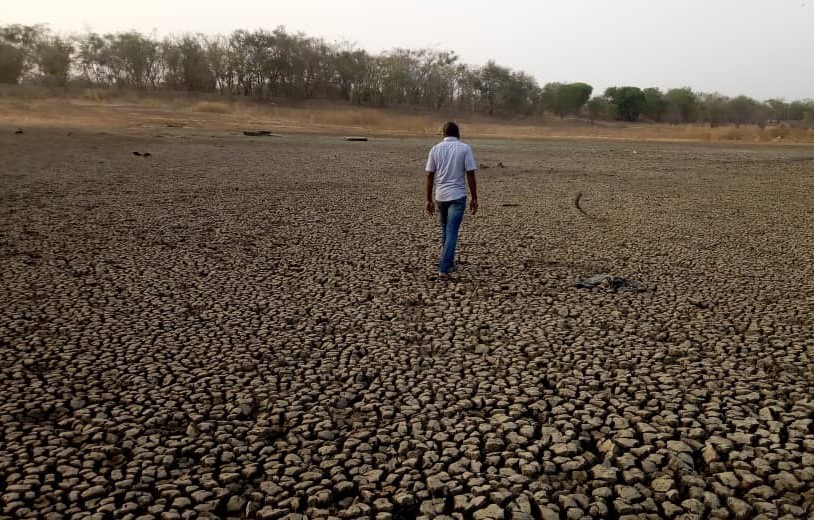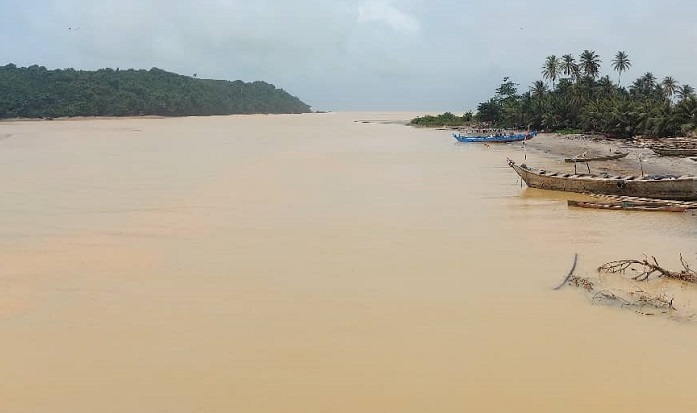What has even caught the wrath of most Ghanaians is the impunity of some foreign nationals mostly Chinese who are brazenly destroying forests, lands, water bodies, and even the fishing industry, while state officials play the ostrich.
The exploitation of natural resources has always existed in Ghana but the environmental degradation or detriment to the formal economy has been limited by the scale and techniques of the local people until the emergence of Chinese nationals over the past decades with their sophisticated equipment and which has escalated the situation.
Economic liberalization in China and the greater opportunities for international travel and work available to Chinese citizens have been contributing to a host of Chinese migrant workers flocking to Africa to make their fortunes in a range of industries and Ghana is no exception.
The 2016 ‘Afrobarometer’ survey on the perception of China in Africa, revealed that the perception of China as a resource extractor is highly dominant in Ghana than in any other African country.
Overall, it is estimated that some 50,000 individuals from China have made the journey to Ghana over the past fifteen years. These Chinese migrants brought their expertise and techniques to Ghana, radically disrupting the available natural resources they come across.
Apart from taking advantage of the uneven legal enforcement in Ghana, these Chinese nationals are on record to be paying bribes to local Chiefs who are custodians of these natural resources, and some political heads and the footprints of their destructions are there for all to see.
With ample gold reserves, the mining sector was – and is - of particular interest to these Chinses nationals and Ghana is currently sweating over illegal mining.
Illegal mining (galamsey)
The phenomenon of illegal artisanal mining - known as galamsey, derived from the phrase “gather them and sell” - in Ghana demonstrates the collective impact of individual Chinese migrants.
Such are the concerns about Chinese miners in Ghana that President Nana Akufo-Addo spoke to Nikkei Asian Review in January 2019, stating that “Ghana and China have a strong relationship; however, we have a big problem [with] Chinese involvement in illegal mining activity in Ghana […and] we have decided to do something about it.”
Interestingly, a study by Crawford et al. in 2015 revealed that almost all the Chinese nationals involved in galamsey in Ghana stem from just one county in the Guangxi autonomous region (home to the Zhuang people), in southern China. Dubbed the ‘Shanglin Gang’ after the eponymous county with a long history of gold mining, these Chinese migrants brought their expertise and mining techniques to Ghana, radically disrupting the local mining scene.
Ghana is Africa’s largest (and the world’s 6th-largest) gold exporter in 2021. Such is the scale of this problem that, estimates of the amount of gold leaving the country for China outstrips government revenue from mining, with $2.3 billion worth of gold exiting the country in 2016. Concerns about Chinese miners illegally exporting gold to the UAE have also emerged, with Akufo-Addo noting that there was a $5 billion discrepancy between trade statistics and actual gold exports in 2017.
As China is gaining as a result of illegal mining activities, Ghana continues to lose several hectares of fertile forestlands across the country, especially within the last decade. The Tano Nimiri, Tano-Offin, Numiri, Kobro, Oda, Jimira, and Atewa forests, including many others in the Ahafo, Western, Ashanti, and Eastern regions have all suffered from the illegality.
In 1901, Ghana’s total forest reserve cover stood at 8.2 million hectares but is now estimated to be less than 1.6 million hectares according to the Forestry Commission. The rate of deforestation based on the trend has been pegged at an unsustainably high rate of 65,000 hectares per annum.
Between 2015 and 2018, galamsey-driven deforestation increased from 13,456 hectares to 29,275 hectares. As of 2018, the total extent of forest degradation in protected forest reserves affected by galamsey was about 1058 ha. This is according to data from the Centre for Remote Sensing and Geographic Information Services (CERSGIS).
Given the prevailing rate of deforestation, it is estimated that there will be no natural forest in Ghana by the year 2035.
Many rivers, including the Birim River in the Eastern Region and other water bodies, that take their source from these forests have as a result been left heavily polluted depriving residents in nearby communities of a source of fresh water and putting at risk the lives of over five million other people in major cities in the south whose potable water are sourced from the forests.
The Ghana Water Company Limited (GWCL) is lamenting the cost involved in treating water bodies due to the negative impact of mining.
The company says it is currently burdened by huge sums of monies spent on chemicals to treat high turbidity levels of raw water at various extraction stations.
Addressing a gathering in Koforidua on Tuesday, September 13, 2022, the Communications Manager of Ghana Water Company Limited, Stanley Martey said, mining has become an impediment to the operations of the company.
“The activities of illegal miners are bringing serious challenges because the chemicals used to treat the water are costly. The tariffs adjustments are not enough. The prices of the chemicals are going up and we need more of the chemicals to treat the water because of the heavy pollution and high turbidity levels.”
“If we are unable to treat the water, then we are forced to shut the treatment plant”, Stanley Martey added.
According to the Public Relations Officer of COCOBOD, Mr. Fiifi Boafo, the country has lost 19,000 hectares of cocoa farmlands to illegal mining.
Fiifi Boafo who was speaking on Joy FM’s Super Morning Show, on Thursday 15th September 2022, said the lost lands represent two percent of the cocoa farms in Ghana.
“And indeed, that was at the beginning of the year we’ve commissioned another research now and we think it will be worse than this,” he said.
rosewood harvesting causing havoc in the northern belt
Ghana is already facing the consequences of the fast depletion of its forest reserves. Temperatures in the country are generally rising with the Northern part of the country recording temperatures as high as 43 degrees Celsius. The rainfall pattern has also become unpredictable as the volume of rain has reduced by about 20% since the 1960s according to the Environmental Protection Agency (EPA). The decline is expected to continue according to Ghana’s National Climate Change Adaptation Policy if things remain the same and this poses a threat to the country’s agricultural sector in which farming is largely rain-fed.
That is why the illegal harvesting of rosewood in the country, especially in the northern belt has also become a source of worry for many people.
In July 2019, Environmental Investigation Agency (EIA), released BAN-BOOZLED: How Corruption and Collusion Fuel Illegal Rosewood Trade in Ghana. The investigation findings pointed to a massive institutionalized timber trafficking scheme, enabled by high-level corruption in the forest sector. The report showed that despite the fifth ban in place since March 2019, the illegal trade in West African rosewood (Pterocarpus Erinaceus) continues to flourish in Ghana.
In their latest publication, the EIA revealed that 3,007,750 kg of rosewood equivalent to $ 2,169,458 was imported by China from Ghana in November 2021, in breach of Ghanaian regulations prohibiting the harvest, transport, and export of the species.
According to the EIA, since March 2019 when the last ban started, 230,878,040 KG, the equivalent of $147,662,115 USD, of rosewood has been imported by China from Ghana.
The lack of trees in the Savannah area as a result of the rosewood logging has been very devastating in the last few years. For instance, the Damongo Agriculture Dam has been the main source of drinking water for the residents of Damongo, the capital of the Savanna Region of Ghana. But, last year, the region witnessed a severe harmattan season, with the main source of drinking water drying up, leaving many women and children trekking miles and spending hours at the few available boreholes to get water for their families.

The Damongo Agriculture Dam was dried up last year
The residents blamed the uncontrolled harvesting of rosewoods which are common in the area for their woes.
The Fishing Sector
The fishing sector has not been spared by the Chinese nationals and their illegal activities are having a negative effect on the local fisher folks.
Ghana is missing out on 14.4 -23.7 million US dollars yearly in fishing license fees and fines from trawlers, a new report by the Environmental Justice Foundation (EJF) has revealed.
According to the report, Ghana’s fees and fines are kept low for local vessels – yet 90% of the Ghanaian trawl fleet is owned by Chinese corporations who use local ‘front’ companies to register as Ghanaian and circumvent the law. This opacity over ownership allows Chinese corporations to pay well below the market value for access to Ghana’s ocean resources, as well as commit illegal fishing offenses without fear of significant repercussions.
In 2019 for instance, a single, state-owned Chinese company with trawl operations in Ghana reported operating revenue of around US$ 164.5 million, also receiving subsidies for its overseas fishing operations of around US$3.0 million in the same year.
Fines given out for illegal fishing and other offenses are also much too low, the report found. Not only has this resulted in unrealised revenue of around US$12 million in 2015 and US$17 million in 2018, but it is also failing to deter such offenses, the report says.
Trawlers have engaged in widespread illegal fishing in Ghana’s waters, failing to report huge catch volumes to the state and decimating the ‘small pelagic’ fish populations which are reserved for local communities. There is now a grave risk that Ghana’s fisheries will soon collapse, impacting the livelihoods of over 2.7 million Ghanaians.
The report identified several cases of alleged illegal fishing in Ghana linked to a Chinese state-owned corporation in receipt of government subsidies, Shandong Zhonglu Oceanic Fisheries Co Ltd. A second Chinese state-owned company, the Shandong Ocean Fishery Development Corporation, was also linked with cases of alleged illegal fishing.
The case of impunity
Many of these Chinese nationals engaged in illegal activities have been arrested in the country but their prosecution has been a matter of concern for all Ghanaians.
The most infamous case that outraged the nation involved a Chinese woman who was described as the “galamsey queen”. En Huang, for that, was her name, was arrested on May 9, 2017, together with her gang of four other Chinese nationals.
Aisha Huang, as she was popularly called, was charged with three counts of undertaking small-scale mining operations, contrary to Section 99 (1) of the Minerals and Mining Act, 2006 (Act 703); providing mining support services without valid registration with the Minerals Commission, contrary to the Minerals and Mining Act, 2006 (Act 703); and the illegal employment of foreign nationals, contrary to the Immigration Act, 2000 (Act 573).
The other four accused persons were charged with disobedience of the directives given by or under the Immigration Act, 2000 (Act 573). This was two months into the heat of the campaign against illegal mining, a campaign championed by the Media Coalition Against Galamsey.
Aisha was arraigned before the court on May 9, 2017, for engaging in galamsey activities at Bepotenten in the Amansie Central District in the Ashanti Region.
However, on December 19, 2018, the Attorney General filed a nolle prosequi to discontinue the trial. She was also deported.
The then Minister of Lands and Natural Resources, Kwaku Asomah Cheremeh, provided an excuse that the government’s critics described as irresponsible.
“Our discretion was to the effect that the trial of Aisha Huang should be truncated to afford her the opportunity to go to her country. That was in line with the laws of our country. The Attorney General is clothed with the capacity to enter nolle prosequi in respect of this matter,” Asomah-Cheremeh told JoyNews.
In April 2019, the then Senior Minister, Yaw Osafo-Maafo, told Ghanaians at a town hall meeting in the United Kingdom that the government didn’t want to sacrifice its diplomatic relations with China.
He said the Akufo-Addo administration intended to partner with China in key infrastructural projects, including the $2 billion Sinohydro deal. “Today, the main company that is helping develop the infrastructure system in Ghana is Sinohydro, it is a Chinese Company. It is the one that is going to help process our bauxite and provide about $2 billion to us,” he said in justification.
“So, when there are these kinds of arrangements, there are other things behind the scenes. Putting that lady [Aisha] in jail in Ghana is not going to solve your economic problems.
“It is not going to make you happy or me happy. That’s not important. The most important thing is that she has been deported from Ghana,” he added.
Fast forward to the beginning of September this year and Aisha Huan was in the grips of the Police again after being deported in 2018.
Per the brief facts of the prosecution, she was said to have returned to her country and changed her identity only to come back to Ghana and commit the same crime.
She is said to have applied for a TogoVisa and went through the borders into Ghana and back to the galamsey business in a town in the Ashanti Region.
The three others with her are said to be selling mining equipment and dealing in gold without a valid licence in Accra. They were arrested upon Intelligence by National security.
On June 24, 2021, The Fourth Estate wrote to the Ghana Prisons Service through the right to information (RTI) requesting data including the number of foreign inmates in the country’s prisons.
The service responded in a letter dated July 29, 2021. From the data, The Fourth Estate found that there were only two Chinese convicts in the country’s prisons as at July 2021.
When The Fourth Estate followed up, the Prison Service later declined to provide the crimes that got the two incarcerated. The two Chinese in Ghana’s prisons is in spite of the hundreds of Chinese illegal miners arrested from 2013 to 2020.
According to data compiled by the Ghana Immigration Service (GIS), a total of 1,641 Chinese nationals involved in illegal mining in Ghana were arrested and repatriated between 2009 and August 2022, which shows that 1,018 were repatriated between 2009 and 2016, and between 2017 and August 2022, 623 Chinese involved in illegal mining have been repatriated.
Speaking in an interview with ghenvironment.com, the Project Coordinator of North Code Ghana, a non, governmental organization, Mr Dokurugu Andrews said, the laws are not specific about environmental crimes, hence the impunity.

The current state of River Ankobra is due to illegal mining
“If someone is arrested for doing illegal mining, we tend to look out for things like mining without a license or selling precious minerals without a license but in terms of harm done to the soil, harm to the river and forest, it is not clear”, he said.
He, therefore, called for legislation that makes it punishable for specific forms of abuse of the environment.
He noted further that, there is a way out in dealing with the situation where the Chinese are benefitting while Ghana loses, adding that, there is reluctance or inability to execute the ways out.
Mr Andrews said “The laws are quite clear about who comes in, who can mine, and how you can go about it, so if somebody is doing it wrongly, we should be able to check it. It is in the law that small-scale mining should be limited to only Ghanaian nationals, yet you find the Chinese and other nationals involved in small-scale mining and other illegal activities and I think we know it, and the state and other stakeholders have ways to deal with it. So I just want to think that, we simply haven’t demonstrated efficient commitment and I think that maybe people with the power to make the change are probably profiting from the status quo and therefore are not in a hurry to make a change”.
He concluded, “If they are really committed to changing it, our government, our security, and our chiefs am sure they should be able to root this out. Because if they pretend they are hiding, you can’t hide and do galamsey, that activity is simply too visible, you can’t hide and cut rosewood”.
Citation:
Jeremy Luedi: Galamsey in Ghana and China’s illegal gold rush.
The Environmental Investigation Agency (EIA): “Rosewood Revealed” EIA Offers Transparency to Ghanaian Rosewood Trade”.
HAGAN SIBIRI: The Dilemma of Chinese Gold Miners in Ghana, 2020
The Fourth Estate: Only two Chinese citizens in Ghana’s prisons despite hundreds arrested for illegal mining. By Seth Bokpe. 2022
Environmental Justice Foundation: Ghana losing millions of dollars as Chinese fishing trawlers hide ownership. 2021
International Centre for Investigative Reporting: How illegal mining is wiping out Ghana’s forests. 2019
Crawford et al. 2015

 Chinese illegal miners arrested, with some Ghanaian nationals. Credit: The Fourth Estate
Chinese illegal miners arrested, with some Ghanaian nationals. Credit: The Fourth Estate
Comments